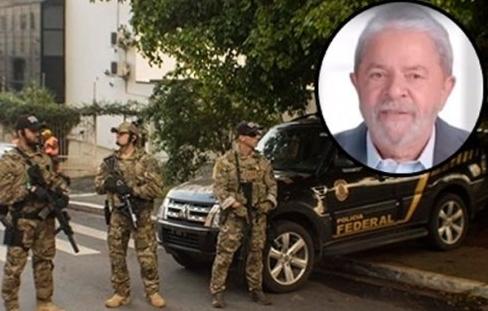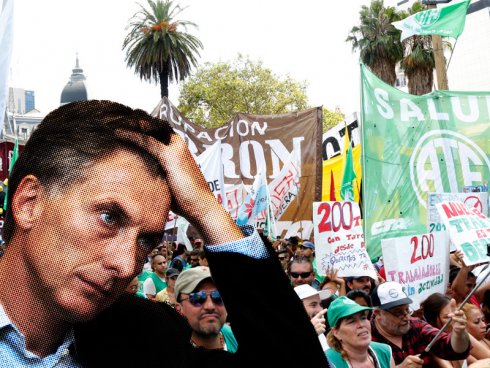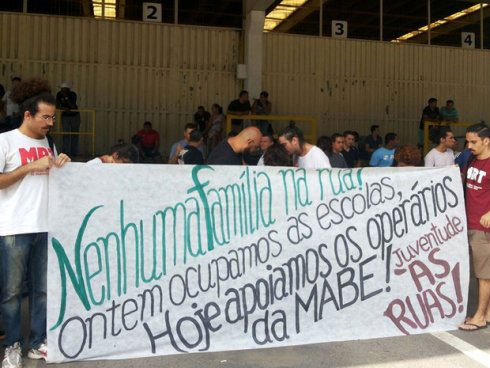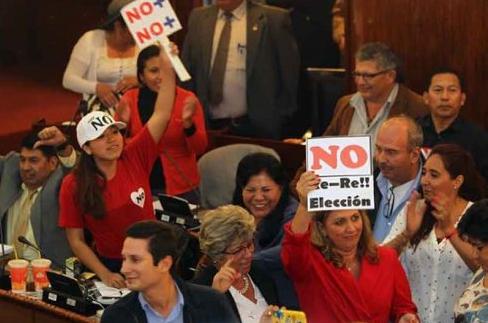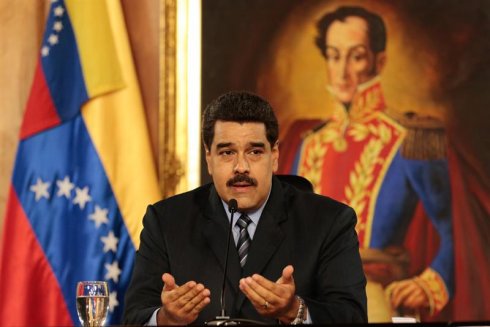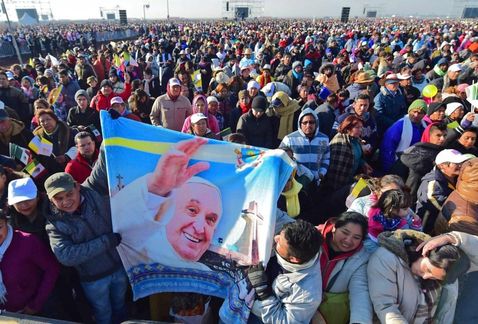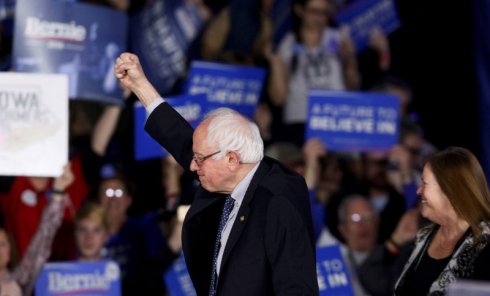Statement by the LTS - Venezuela
Venezuela without Chávez: a new stage opens
07/03/2013
On the afternoon of Tuesday, March 5th, the vice president of Venezuela, Nicolás Maduro, announced the death of President Hugo Chávez from the cancer that he had been diagnosed with in June 2011. It is no wonder that Chávez’s death has caused a stir both at home and abroad: for nearly a decade and a half he ruled Venezuela, bringing about a major change of political regime and launching a project that placed him at the centre of important social and political clashes in recent years, a project that reflected the aspirations of the majority of working people. He was a leader of the masses who entered political national history two decades ago, becoming the country’s main political leader. Chávez also had a great influence in the rest of Latin America, and even worldwide. There is no doubt that he is one of the most important political figures in Venezuela’s recent history.
We in the LTS (Liga de Trabajadores por el Socialismo) understand and respect the grief of many workers, peasants, and poor people at the death of Chávez, and condemn the ‘celebrations’ of right-wing politicians. However, precisely because we are talking about a political leader who defined himself as a representative of the interests of working people and the poor – and because his death has given rise to discussions about his legacy – as revolutionary socialists, we do not share the evaluation made by the Venezuelan national government and international supporters of Chávez, since, as we have argued in recent years and will explain below, Chávez was not an expression of revolutionary or anti-capitalist leadership.
Tens of thousands of Venezuelans, including workers and young people from the poorest sectors of society, were present at Chávez’s funeral. The impact of his death was felt throughout Latin America. This grief is understandable because, in comparison with the neo-liberal policies of the Punto Fijo parties, Chávez redistributed oil revenues. Under his administration oil revenues rose exponentially, from US$20 to US$100 a barrel, which allowed him to make concessions to the masses, especially to the poorest groups, and to invest in healthcare and education programmes. We must bear in mind that poverty affected 80% of the population by the end of the 1990’s. In the most ‘leftist’ period of his government, after the popular mobilisation that defeated the military coup of April 2002 carried out by the right-wing and the business community with the support of the US Embassy and conservative governments like that of José María Aznar in Spain, Chávez gained widespread mass support by partially reversing the privatisations of the 1990’s (buying back some companies at market prices), and rejecting ALCA (the free trade policy promoted by the United States).
Despite his concessions to the mass movement and friction with the White House, especially under George Bush, for us, Chávez was not a ‘revolutionary’ or an ‘anti-imperialist’. Actually, his coming to power led to a solution to the crisis of the bourgeoisie after the Caracazo in 1989, reconstituting the state’s authority, especially that of the armed forces, and by establishing a Constituent Assembly he replaced the discredited Fourth Republic with a new ‘Bolivarian’ regime based on plebiscitary mechanisms – a Bonapartist regime around the figure of the president. Resting on the military and drawing his political support primarily from the urban poor, Chávez built a system with features of what Marxists call ‘sui generis left Bonapartism’ – such governments make concessions to the masses in order to gain their support and manoeuvre against imperialist pressure and foreign capital, without ever overcoming dependence and backwardness within the framework of capitalist private property. But essentially, Chávez expressed a way to lead a capitalist society in crisis, especially when there is an absence of any real revolutionary process that would enable the exploited classes to be in the leadership of the struggle for political power. Lacking a revolution, this Bonapartist leadership emerged from the bourgeois armed forces.
These policies gained Chávez huge support, especially among the most impoverished groups in society; and he was also widely admired in the rest of Latin America and throughout the world. Despite the fact that during his 14 years of government the interests of the leading economic and business sectors were never touched and could always maintain their profits, Chávez was always bitterly opposed by the employers. Under Chávez, the state had a more interventionist role in the economy, but overall this intervention was in the service of preserving the interests of the national bourgeoisie, including new sectors like the so-called ‘Bolivarian bourgeoisie’, which was enriched during this period. In addition, a large state bureaucracy has emerged to administer key state companies in the oil and telecommunications sectors and other economic areas.
The limits of Chávez’s bourgeois nationalism
After the 2002 coup was defeated, Chávez began the nationalisation of enterprises that had been privatised in the 1990’s, including CANTV, the Bank of Venezuela and Sidor (previously bought for a pittance by Techint), as well as other companies in the cement and food industries. However, these nationalisations were actually purchases made at the market price, so the employers and large economic groups were not damaged.
In terms of economic structure, under Chávez, Venezuelan capitalism did not overcome its backward character, continuing to rely mainly on oil revenues and with little or no industrial diversification. The general increase in imports in recent years (a high percentage of basic food staples is imported), the extreme dependence on oil, the increasing state indebtedness and the high inflation, kept eroding an economy whose pattern of accumulation has not changed at all in the decade and a half of Chávez’s government. Even in the oil industry, despite a strong nationalist discourse in favour of the state control of hydrocarbons, the establishment of mixed companies in which the state controlled 60% of the shares and multinationals the remaining 40%, meant that the latter not only participated in production and exportation, but became owners of the assets – in other words they appropriated 40% of the entire company, something that they could not do before.
At the point at which Chávez stepped down from government because of his illness, for every US$100 that entered the country through exports, only US$4 was from sources other than the oil industry. This means that if eventually an abrupt decrease in international oil prices takes place, the imperialist economies will try to have their debt paid (which Chávez has always paid punctually) with assets or by taking the country to a payment cessation crisis.
Given the state in which Chávez has left the economy, the bourgeoisie considers that the only way forward is to implement adjustments to the economy, with the working masses and the poor bearing the brunt in order to overcome government debt. These adjustments to the economy had already been announced by Chávez, starting with a currency devaluation at the beginning of February. The economic imbalances and contradictions that come from Chávez’s own project have a very clear and simple reason: Chávez’s conviction not to break with capitalism.
Rather than carrying out a process of elimination of bourgeois property and socialisation of wealth as a base for the resolution of national problems and those of the working class and the poor, Chávez opted for the re-negotiation of portions of oil revenues with the transnational companies. He also increased taxes and ran up a huge state debt. In other words he borrowed from the bankers and capitalist governments.
The relationship with imperialism
During President Bush’s government, Chávez advanced an independent and confrontational foreign policy with a strong anti-American discourse, which he gradually modified, leading eventually to a political U-turn by the middle of his second term. This was done in order to help maintain regional order. Chávez did not take part in the occupation of Haiti which was led by the US and supported by Latin American governments, including Argentina and Brazil. He had a close relationship with Iran and opposed the wars in Iraq and Afghanistan, being also opposed to the ‘war against terror’ conducted by Bush.
Oil revenues allowed Chávez to expand his regional influence by making diplomatic use of them, selling the oil cheaply to countries like Nicaragua, Honduras and others. This policy was expressed more particularly in relation to Cuba, of which Venezuela has become a true supporter, guaranteeing its survival by giving it oil at subsidised prices, while at the same time promoting the Castro bureaucracy’s pro-capitalist openness policy. As part of this policy of gaining regional influence, Chávez set up ALBA, which sought to rival the projects promoted by free trade imperialism.
However, taken as a whole, Chávez’s foreign policy played a key role in maintaining and working to stabilise regional order in Latin America, including the promotion of regional institutions such as UNASUR, which, although the United States is excluded, doesn’t oppose imperialist interests.
With Obama’s arrival in office, the Chávez regime adopted a more conciliatory policy in relation to the United States. Furthermore, his regime suffered setbacks such as the coup in Honduras against Manuel Zelaya, who was an ally of Chávez and a member of ALBA. This shift towards a more ‘moderate’ policy of appeasement was followed by agreements with President Juan Manuel Santos of Colombia, which led to Chávez’s recognition of the Porfirio Lobo government, the direct offspring of the Honduran coup.
This policy shift is more evident in relation to the Colombian FARC. Chávez at first demanded recognition for them as a legitimate belligerent force but then started to work directly with the projects of the intelligence services and with the policy of President Santos, which entailed the persecution of FARC leaders. Thus, Chávez contributed to the FARC’s encirclement, carried out by the genocidal Colombian army. This collaboration even included the handing over of FARC militants who had taken refuge in Venezuela.
In recent years, Chávez relegated his ALBA plan, which is very weak now, to a secondary status and entered MERCOSUR, the true capitalist business centre of the Southern Cone Latin American bourgeoisie and the transnational corporations operating in those countries. Finally, under a supposed ‘anti-imperialism’ banner, Chávez ended up supporting hated dictatorships such as Gaddafi’s in Libya and Assad’s in Syria, while these dictators were murdering and slaughtering their own people.
What 21st Century Socialism means
Chávez never tired of speaking about 21st Century Socialism, but as we have already explained, this supposed ‘socialism’ meant no more than the implementation of a few reforms, while at the same time maintaining and recomposing the regime of bourgeois domination and guaranteeing business for the capitalists. 21st Century Socialism did not go beyond redistributive policies such as the Missions that involved distribution of oil revenues, and was carried out by a government which deflected and contained the mass movement during a period of rising struggles, in which the prevailing order was being questioned.
Chávez’s 21st Century Socialism leaves intact a society based on exploitation and oppression, albeit nuanced with a dose of ‘social justice’, where the reality of ‘social inequalities’ are obvious and little in reality has changed. Official data shows that in 2010 the richest 20% of the population had 45% of the national income, while the poorest 20% accounted for a measly 6%. Those families that make up the 40% of the population with low incomes receive only 18% of the national income. Meanwhile, there are still many entrepreneurs and a large financial sector, providing an ostentatious living for the rich and the upper middle class.
According to Chavism, one can speak about socialism even though the abolition of bourgeois property or the destruction of the bourgeois state is not on the agenda. Apparently, one can be ‘revolutionary’ without developing workers and the people’s power against the capitalists and their state, and even, it seems, go to lengths to strengthen confidence in the capitalist state. One can be anti-capitalist although capitalist property and businesses are always guaranteed, albeit with elements of state property and a dose of government regulation. And one can be ‘workerist’ even though workers’ exploitation is preserved and there are measures aimed at criminalising labour struggles which challenge the state or capitalism. This inconsistency between rhetoric and practice is part of a legacy that does nothing to clarify the class consciousness of the exploited. In fact it does the reverse, it confuses it.
The criminalisation of workers’ struggles and popular protests
Under Chavism a series of laws were passed that make it illegal in certain workplaces to go on strike, call demonstrations or organise assemblies. Under these laws, more than a hundred workers have been sent to court or have had their trade union or political activities restricted and some have been sent to prison. One of the best known cases is that of mineworker Ruben González, who was sentenced to 7½ years in prison for going on strike, but was released after 18 months following a major campaign by other workers. It is a legacy of employers’ coercion and disciplinary measures that far from helping advance the cause of workers, contributes to the growth of fear, demoralisation and submission. All these laws were passed on the initiative of the Chavista majority in the National Assembly and did not face any kind of opposition whatsoever from Chávez – in fact, quite the opposite!
According to the Chávez regime, workers must be praised when they march in an orderly fashion behind the government and limit their struggles within the framework of ‘socialism with entrepreneurs’, but when they develop methods of struggle outside the supervision of the state, they should be discredited and attacked verbally and physically. On more than one occasion Chávez himself spoke out against workers who were engaged in difficult struggles. He even threatened to send in the army to control state-owned companies if workers continued to push their demands. He also directed the secret services to keep union leaders under surveillance. Chávez’s political legacy is that the exploited and the poor must put their trust in and be thankful to the bourgeois state.
Class collaboration
Chávez’s bequest to the masses is the non-revolutionary and non-socialist idea of class collaboration. That is to say the idea of a ‘nation’ where exploited and exploiters, rich and poor, live in harmony; where there is no attempt to overthrow the exploiters and build a new social order, no attempt to abolish class society; but where exploitation continues masked by the discourse of ‘the greatness of our country’.
We must stress the fact that Chávez did a lot to rebuild the legitimacy and authority of the armed forces. He inculcated the idea of a bond between the people and the armed forces. But these are the same forces that repressed workers and their supporters in Petrocasa, Carabobo, workers in factories in Guiana and Aragua, in Sanitarios Maracay (which was under workers’ control), and oil workers employed by the China National Petroleum Company. The armed forces were also deployed against people demanding housing, indigenous people demanding their rights, and peasants occupying land; they were complicit in the killings of peasants and indigenous landowners and two Mitsubishi workers in Anzoategui. And these are the forces with which Chávez wanted us to fraternise!
While encouraging collaboration with capitalists, Chávez introduced measures which pitted the poor against the working class, holding down wages with the argument that the money was needed for benefits, and described workers’ struggles as being against the national interest.
The post-chavista stage
After almost three months of Chavez’s absence there was a period of uncertainty and lack of political clarity, made worse by the government’s secrecy about his condition. The vacuum led to problems, despite the fact that the authorities gave the appearance of governing normally. Now, with Chávez’s death, there is an open crisis. We are not talking merely about a crisis of political conjuncture, but of a particular way of governing centred on a strong leader who became a charismatic political personality, who, during his long term in office, elevated himself above classes, and even above the different factions of the dominant class, resting on highly politicised armed forces – a system that we call Bonapartism.
Although at the time of his death Chávez was very popular, as was shown by the result of the last two elections, there are political difficulties ahead because the transition takes place under circumstances that were not chosen by the regime. The outcome will depend not only on Chávez’s popularity but on the well-known factional differences within the governing party, the strength of the bourgeois opposition and even on the pressure from imperialism. Chávez cannot easily be replaced as an arbitrator by Nicolás Maduro, despite the latter being selected by Chávez as his successor, and regardless of by how much he wins the next presidential election, much less by any new clique committed to keeping chavismo without Chávez. Bonapartism without a Bonaparte is a formula for chaos.
On behalf of the right-wing opposition, the most likely presidential candidate, Henrique Capriles Radonski, in pre-election mode, expressed the opposition’s “commitment to dialogue and peace in Venezuela”, and offered to assist the government. “This is not the time for differences,” he said, “but for peace and coming together.” This could be a signal that the opposition is looking for an agreed transition to a new form of political control. Although the opposition is not in good shape after losing the last two elections and has seen its own internal divisions intensify, it will try to resolve its differences in order to reposition itself in the post-chavismo era.
We don’t know exactly what form the new regime will take, but the struggle between competing forces will decide. Since December the outlines of the new post-Chávez regime have been quietly taking shape. However, without Chávez everything that seemed solid is beginning to melt away.
Challenges for the working class
New challenges are now facing the working class and the poor, who must beware both the anti-devaluation demagogy of the opposition and the blandishments of the government. They must maintain their class independence at all costs in order to avoid becoming casualties in a dispute between different sectors of the ruling class, who are negotiating the terms of a post-Chávez settlement behind their backs.
Chavismo is preparing to ‘adjust’ its model of governance by reducing the already minimal elements of social justice in favour of higher levels of exploitation to maintain the bosses’ profits. Workers must organise at a rank-and-file level to fight the bosses in both the public and the private sector, and national and regional government, to win better wages, compliance with collective agreements and better working conditions. No confidence must be placed in either of the two factions that are competing to run the country.
Meanwhile, the attack on the wages of working people is continuing, as indicated by the recent devaluation which is making the already high inflation worse. For that reason, it is necessary to fight for automatic, inflation-linked increases in wages to cover the basic family shopping basket. The national wealth should be used for wages and the needs of the people, not for bankers or for paying the foreign debt. Workers should fight for progressive taxation on profits and on the wealthy, for the nationalisation of the banks under workers’ control and for a state monopoly on foreign trade. National resources must be directed into housing, schools, hospitals and other public works, employing workers at a guaranteed living wage. There must be an end to the persecution of activists and the criminalisation of protests – the current charges against more than two thousand workers must be dropped. We want no more murders of workers or of indigenous leaders and we demand justice in the case of the assassination of Sabino Romero.
In order to succeed in this struggle, it is necessary to develop a superior perspective to that associated with Chávez. The working class must forge its own destiny by building its own organisations of self-determination and self-organisation. It must build militant unions which are independent of the state and the employers, and that will fight resolutely for class independence and workers’ democracy, sweeping away the conservative union bureaucracy which is the transmission belt for the interests of the ruling class.
Political independence is the key, although in order to guide this struggle more decisively the building of a revolutionary internationalist workers’ party is necessary. There won’t be a solution to the fundamental demands of the masses without a resolute fight for a government of the workers and the poor. The experience of the Chavista regime shows that the Venezuelan bourgeoisie is unable to lead the struggle for national liberation from imperialism and achieve the unity of Latin America. Bourgeois projects like Mercosur and Alba must be countered with a fight for a Socialist Federation of Latin America.
March 7, 2013
